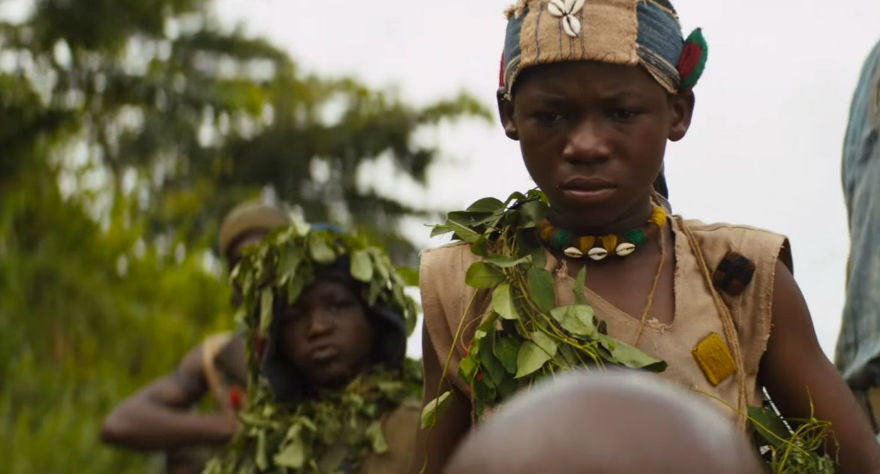
A stunning, unflinching examination of a child soldier's ascension to manhood.

A stunning, unflinching examination of a child soldier's ascension to manhood.
Cary Joji Fukunaga‘s Beasts of No Nation is easily available to millions right now via its juggernaut distributor, Netflix, and that’s a wonderful thing. The streaming platform can only, by its nature, provide a second-rate version of Fukunaga’s intended cinematic experience, however. Beasts is a stunningly presented film destined for not only big screens but for big, booming, very expensive speakers. Through the eyes of a child soldier named Agu (Abraham Attah), the film takes in all the sights and sounds of West Africa, its lush jungle foliage and teeming wildlife and the violent civil war that bloodies it.
We meet Agu in a happy place, wreaking innocent havoc across his little village with his friends and spending his nights bonding with his loving older brother. His world gets obliterated in a flash when militants ravage the village, separating him from his family for good. Before he has time to grieve a rebel leader called Commandant (Idris Elba) scoops him up and trains him to kill, Agu’s gradual, traumatic indoctrination by his new father figure informing the rest of the film. From child to killer, his innocence dies a slow death.
Sections of the film are hard to watch for their explicit, unflinching depictions of violence, particularly when Agu’s the one inflicting harm. We see death in front of our eyes, plain and simple, and it’s nauseating. War is an unfortunate reality for many in West Africa and Fukunaga’s truthful representation of its horrors is done out of respect for the real lives lost. The film isn’t merciless, though. Surrealist imagery comes into play when the violence ratchets up, softening the blow of the unspeakable acts Agu and the soldiers commit. During a brutal village raid scene Agu enters a state of half-hallucination, the greenery around him turning a bright crimson as gunfire rains.
The film is based on the 2005 novel of the same name by Uzodinma Iweala and examines the lives of child soldiers in grisly detail. The hardest-to-watch moment comes when Commandant demands Agu kill a man who claims to be an innocent bystander. The tragedy of Agu’s transformation is heartbreaking, but his internal struggle to retain some measure of morality gives us hope that goodness may endure. Voiceover work helps us keep track of Agu’s state of mind á la Terrence Malick, but his words never distance us from onscreen events.
Commandant doesn’t transform over the course of the story in the same way Agu does, but our perception of him does, his arc taking a similar shape to Agu’s only curved in the other direction. His thirsty obsession with power and dominance is ostensibly the hulking leader’s greatest strength, but when the tide goes out and fortunes are no longer in his favor, his true colors come into plain view.
Commandant’s seductive hold over Agu is shocking and unsettling, and yet it makes sense because Elba’s got the same hold on us. Elba’s a force of nature, imposing his will with his massive frame and booming voice. A back-heavy hairpiece makes him look like a silverback gorilla, his wide, wild eyes accentuating his animalistic appearance. The only thing more powerful than Elba’s performance is the energy he shares with Attah: their relationship, which drives the film, says more about the nature of manhood in one scene than other movies do in 90 minutes.
What’s most surprising about Beasts is how serene it can be despite the chaotic nature of its story. During his time with the rebels, Agu makes a friend, another boy named Strika (Emmanuel Nii Adom Quaye). Caught in the middle of a firefight, the rebels flee into the jungle. Looking back, Agu notices Strika huddled in front of a tree. He begs Strika to move his feet, but without a word, the cowering boy simply shakes his head slowly in solemn defeat. The moment struck me in an odd way that I can’t put my finger on, but I do know that it hit me deep; I’ve thought about it every day since I saw the film. Also, if you listen closely, you’ll notice the low hum of the teeming wildlife permeating almost every scene. The sound design is phenomenal, fully immersing you in Agu’s world without you even knowing it.
The film doesn’t depict a specific conflict (Agu’s village is fictional as are all of the characters), which liberates the story, creatively. Fukunaga clearly had no intentions of making Beasts political at all, instead fully concerning it with the psychological developments and complexities of its characters. It’s a one-hundred-percent humanistic, visceral story that transcends any issue or conflict you could read about in the news. Fukunaga’s found major success so far in his career—Sin Nombre, Jane Eyre and True Detective are uniformly excellent—but Beasts of No Nation is his finest work yet.